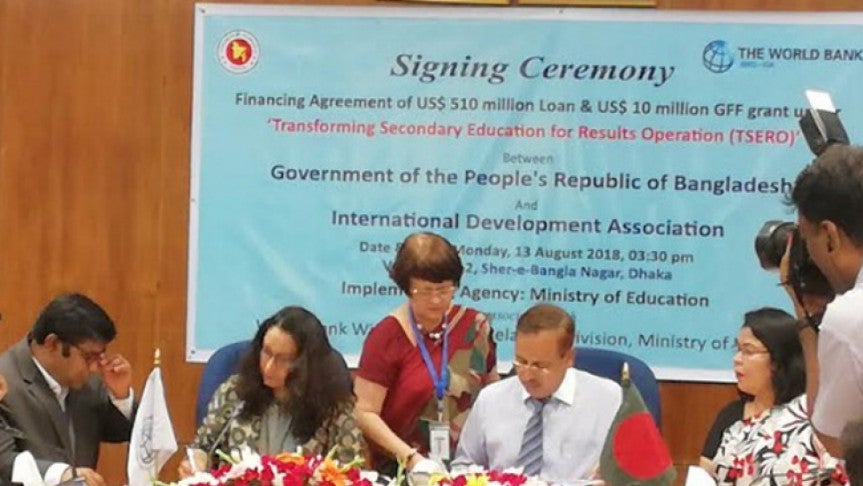WB, Bangladesh sign US$ 510 mn deal to develop secondary education

Dhaka: Bangladesh government and the World Bank on Monday signed a US$ 510 million loan agreement with a view to enhance the quality and effectiveness of secondary education system in the country.
In addition, the government also signed US$ 10 Million Global Financing Facility (GFF) Grant Agreement with the International Development Association (IDA) of the World Bank group, reports the UNB.
The agreement was signed by Kazi Shofiqul Azam, Secretary of Economic Relations Divisionand Rajashree Paralkar, acting World Bank Country Director for Bangladesh, Bhutan and Nepal, on behalf of the government and the World Bank respectively at the Economic Relations Division in the city.
The Transforming Secondary Education for Results (TSER) programme will focus on improving quality and access to education so that students, specially girls and children from low income households, can complete their secondary education through providing stipends and school grants.
‘Bangladesh has made remarkable progress in advancing access to education and has achieved gender parity in secondary education,’ said Rajashree Paralkar adding that, ‘Continuing to invest in quality education is critical for Bangladesh to achieve its goal of becoming a middle-income country.’
Through benefitting 13 million students studying in grades 6 to 12, the programme will support modernization of the curriculum, reformation of examination system, learning assessments of students in grade 6, 8 and 10 to identify learning gap and suggest policy actions, she said.
She also said, GFF grant is aimed at improving adolescent health and building girls’ school.
Kazi Shofiqul Alam said, the 7th five-year plan recognises secondary education as a critical education cycle to equip the youth with foundational skills to enhance work productivity and learn new technologies.
‘This financing will contribute to the government’s nation-wide ‘Secondary Education Development Programme’ and help to ensure that the future generation are equipped with the right skills needed for a growing economy’, he added.
The credit form the World Bank’s IDA with zero-interest loan has a 38-year term including a six-year grace period, and a service charge of 0.75 percent.
The TESRO will be implemented for the period of January 2018 to December 2022.
Senior officials of the government and the World Bank were also present in the signing ceremony.

 NTV Online
NTV Online




